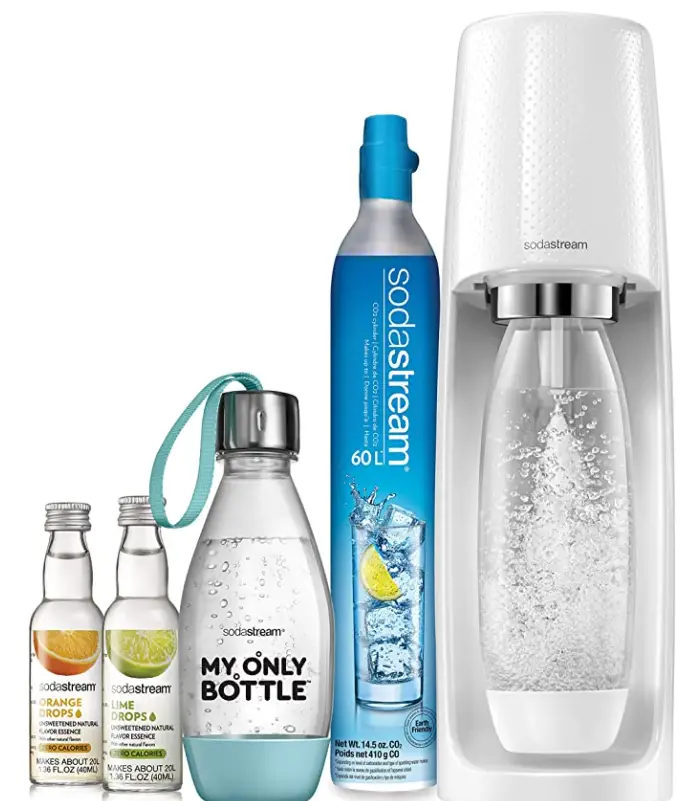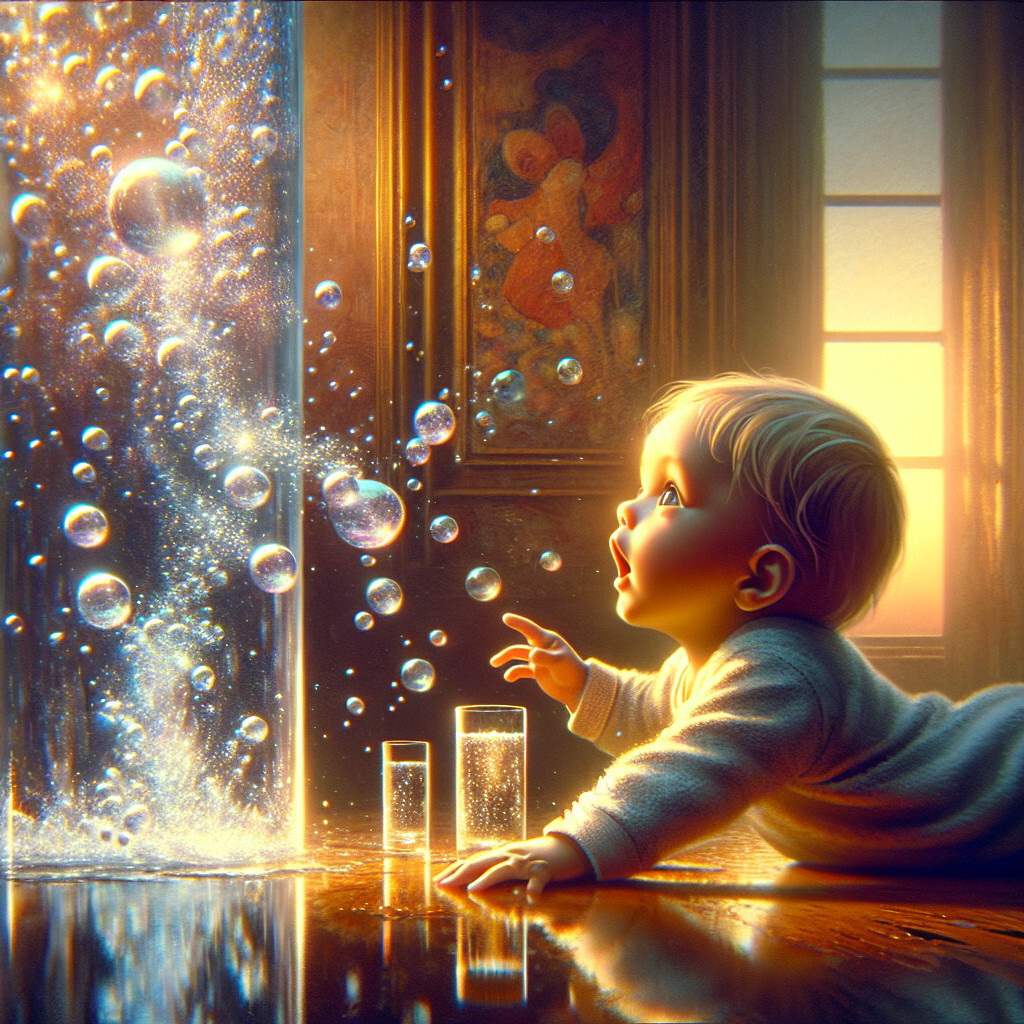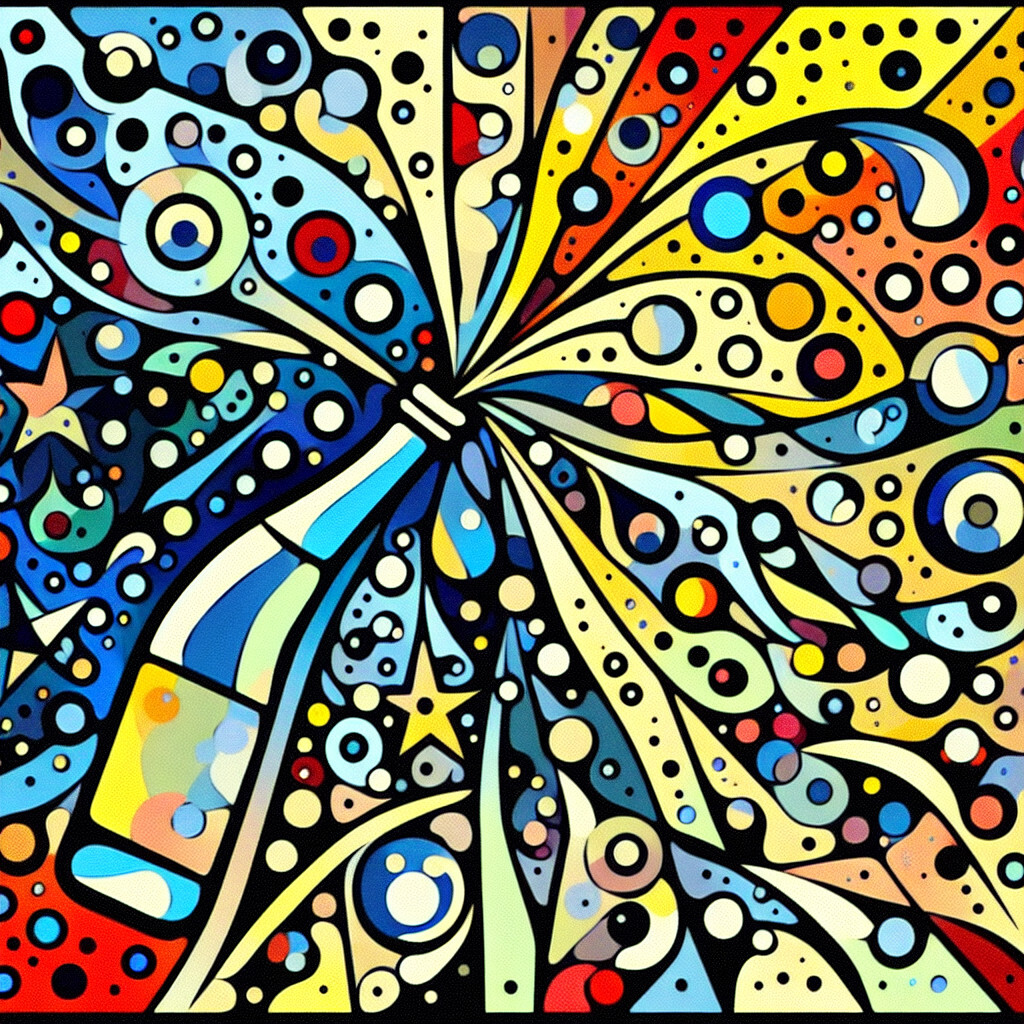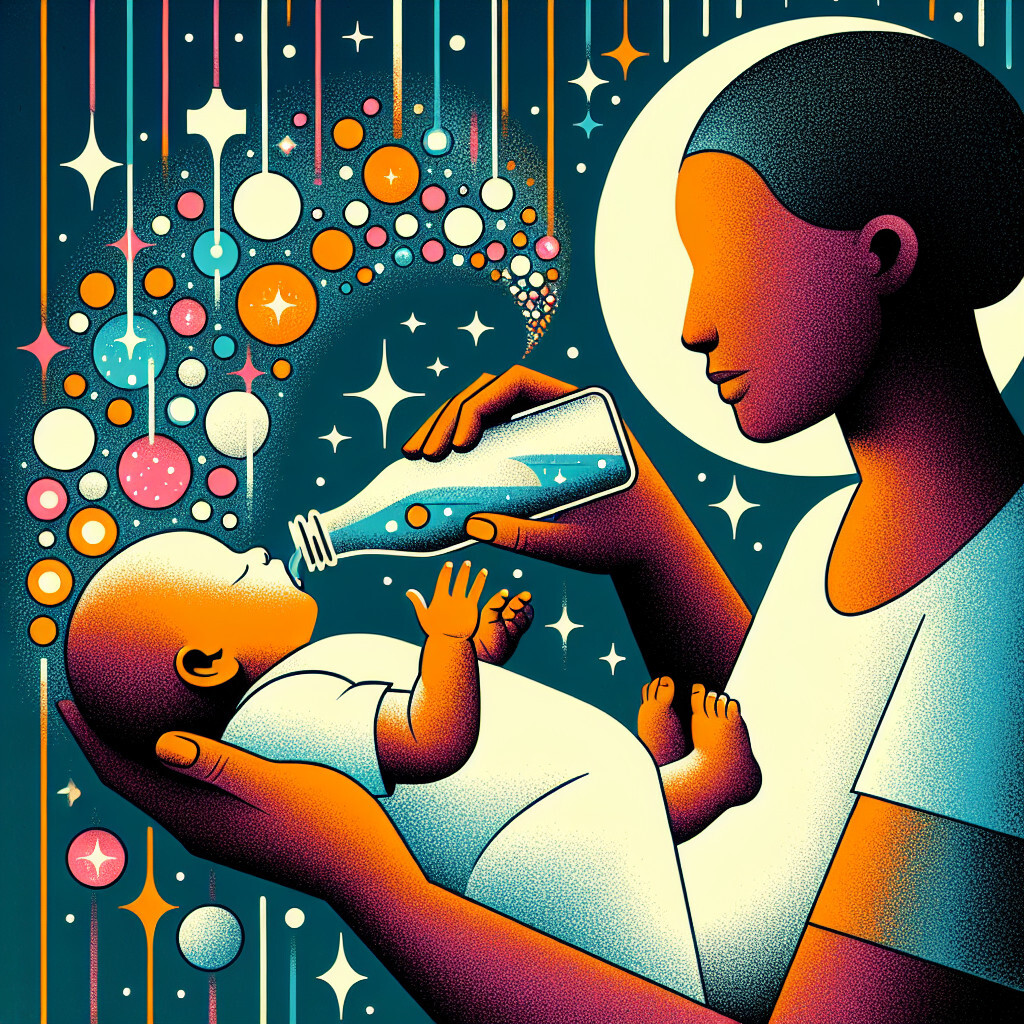-
Table of Contents
“Infuse their world with bubbles: Baby on Sparkling Water.”
Introduction
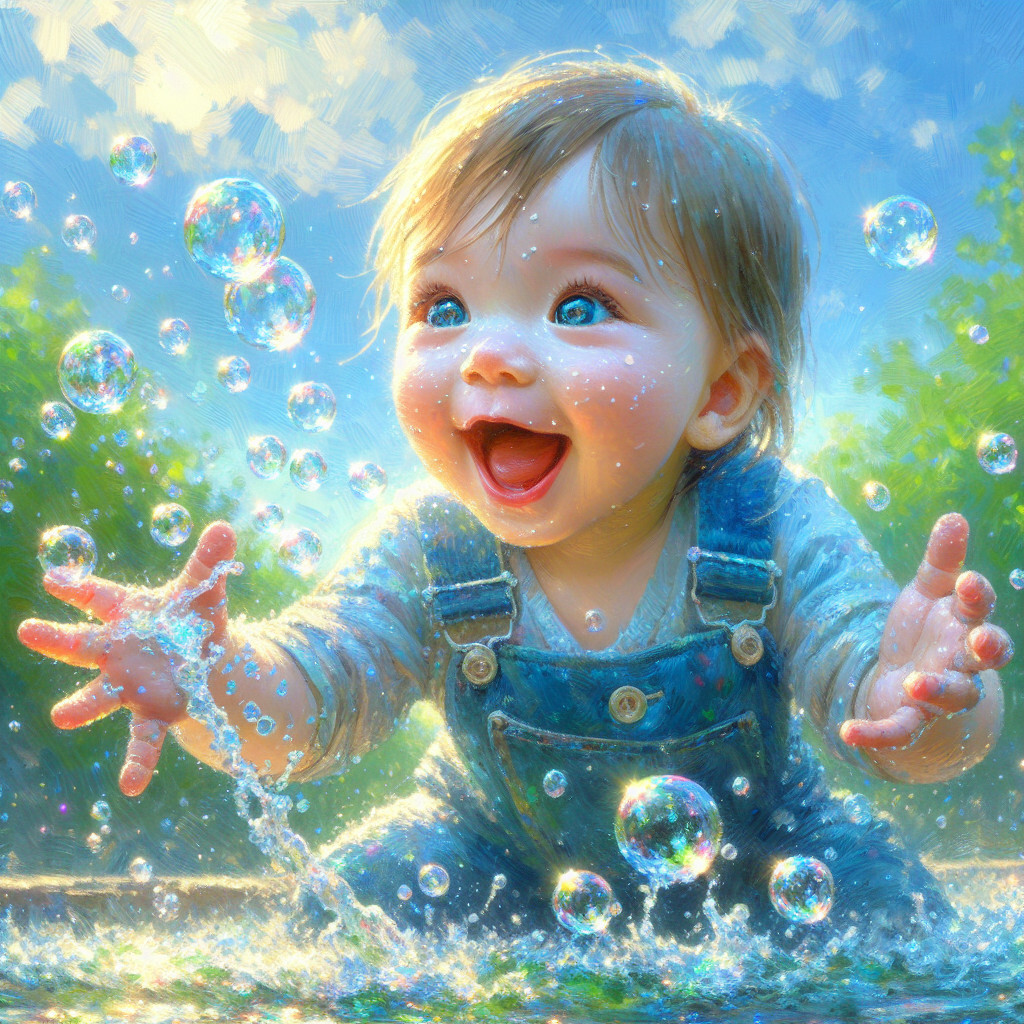
Baby on sparkling water is a topic that explores the suitability and safety of introducing sparkling water to a baby’s diet. It delves into the potential health implications, nutritional value, and the appropriate age for babies to start consuming this type of beverage. This subject is of interest to parents and caregivers who are considering diversifying their baby’s fluid intake beyond the usual milk and water.
The Effects of Sparkling Water on Baby’s Health
Sparkling water, also known as carbonated water, has gained significant popularity in recent years due to its refreshing taste and perceived health benefits. However, when it comes to infants, parents often wonder whether it is safe to introduce sparkling water into their baby’s diet. This article aims to shed light on the effects of sparkling water on a baby’s health.
Firstly, it is essential to understand what sparkling water is. It is simply water into which carbon dioxide gas has been dissolved under pressure, resulting in a fizzy drink. It does not contain any sugars, calories, or caffeine, making it a healthier alternative to sugary soft drinks. However, the question remains: is it suitable for babies?
The primary concern with giving sparkling water to babies is the potential for gas and bloating. The carbonation in sparkling water can cause a build-up of gas in the stomach, leading to discomfort and bloating. This can be particularly problematic for babies, who have immature digestive systems and may struggle to expel the excess gas. This could result in discomfort, fussiness, and even colic in some cases.
Moreover, sparkling water’s acidity could pose another issue. The process of carbonation makes sparkling water more acidic than regular tap water. While this acidity is not harmful to adults, it could potentially harm a baby’s developing teeth. Prolonged exposure to acidic drinks can lead to dental erosion, which is a concern even if your baby only has a few teeth.
Additionally, the sensation of drinking sparkling water can be quite intense for a baby. The bubbles created by the carbonation can cause a tingling sensation that might be overwhelming for a baby’s sensitive palate. This could make them averse to drinking water in general, which is not ideal as water intake is crucial for a baby’s health.
It’s also worth noting that while sparkling water is free of sugars and calories, it also lacks the essential nutrients that babies need for their growth and development. Babies under six months should ideally be on a diet of breast milk or formula, which provides all the necessary nutrients. For older babies, while water can be introduced, it should not replace nutrient-rich drinks like breast milk or formula.
In conclusion, while sparkling water is not inherently harmful, it is not the best choice for babies due to potential issues with gas and bloating, acidity, and the intense sensation of carbonation. It also lacks the nutrients that babies need. Therefore, it is advisable to stick to breast milk, formula, and plain water for your baby’s hydration needs. If you are considering introducing any new food or drink into your baby’s diet, it is always best to consult with a pediatrician or a registered dietitian. They can provide personalized advice based on your baby’s age, health, and developmental needs. Remember, every baby is unique, and what works for one might not work for another.
Understanding the Risks and Benefits of Giving Sparkling Water to Babies
The topic of introducing sparkling water to a baby’s diet is one that has been met with varying opinions from parents and pediatricians alike. While some parents may consider it a harmless and fun way to introduce their little ones to new tastes, others may be wary of potential health risks. This article aims to provide a comprehensive understanding of the risks and benefits of giving sparkling water to babies.
Sparkling water, also known as carbonated water, is water into which carbon dioxide gas has been dissolved under pressure. This process gives the water its characteristic bubbles and fizz. While it may seem like a harmless beverage, it’s important to understand that the digestive system of babies is not as developed as that of adults. Therefore, introducing new substances into their diet should be done with caution.
One of the primary concerns with giving sparkling water to babies is the potential for gas and bloating. The carbonation in sparkling water can cause a build-up of gas in the stomach, leading to discomfort and potential complications. Babies already have a sensitive digestive system, and the introduction of carbonated beverages can exacerbate this sensitivity, leading to discomfort and potential complications such as colic.
Another concern is the potential for tooth decay. While sparkling water is generally free of sugars and sweeteners, the carbonation process can make the water slightly acidic. This acidity can potentially harm a baby’s developing teeth, leading to enamel erosion and tooth decay. Therefore, it’s advisable to limit the intake of sparkling water, especially in babies who have started teething.
On the other hand, there are some potential benefits to introducing sparkling water to a baby’s diet. For one, it can be a fun way to introduce new tastes and textures. The bubbles and fizz can be an interesting sensory experience for babies, and it can help them become more open to trying new foods and drinks as they grow.
Additionally, sparkling water is a healthier alternative to sugary drinks and juices. While it’s important to limit the intake of sparkling water due to the reasons mentioned above, it can be a good option for special occasions or as an occasional treat. It’s also worth noting that not all sparkling waters are created equal. Some brands may add sugars, sweeteners, or artificial flavors, so it’s important to read the label carefully.
In conclusion, while there are potential risks associated with giving sparkling water to babies, there are also potential benefits. The key is moderation and careful selection of the type of sparkling water. It’s always advisable to consult with a pediatrician before introducing any new foods or drinks into a baby’s diet. They can provide personalized advice based on the baby’s age, health, and developmental stage. Remember, every baby is unique, and what works for one may not work for another. Therefore, it’s important to pay close attention to how your baby reacts to new foods and drinks, and to make dietary decisions based on their individual needs and responses.
Why Sparkling Water is Not Recommended for Babies
The topic of infant nutrition is one that is often fraught with a myriad of questions and concerns, particularly for first-time parents. One such question that has been gaining traction in recent times is the suitability of sparkling water for babies. While sparkling water has become a popular beverage choice among adults due to its refreshing taste and perceived health benefits, it is not recommended for babies.
To begin with, it is important to understand what sparkling water is. Essentially, it is water that has been infused with carbon dioxide under pressure, which gives it its characteristic fizz. This carbonation process can make the water more acidic, which is one of the primary reasons why it is not suitable for babies.
Babies have a delicate digestive system that is still developing. The acidity in sparkling water can potentially upset this system, leading to discomfort and even health issues such as acid reflux. Moreover, the bubbles in sparkling water can cause bloating and gas, which can be particularly uncomfortable for a baby.
In addition to the potential digestive issues, sparkling water also lacks the necessary nutrients that babies need for their growth and development. Unlike breast milk or formula, which are packed with essential nutrients, sparkling water provides no nutritional value. Therefore, it should not be used as a substitute for these vital sources of nutrition.
Furthermore, the introduction of sparkling water can potentially interfere with a baby’s feeding routine. Babies have small stomachs and feeding them sparkling water can fill up their stomachs, reducing their appetite for nutrient-rich foods or milk. This can lead to nutritional deficiencies and hinder their growth and development.
Another concern with sparkling water is the potential risk of choking. The bubbles in sparkling water can cause a baby to choke, particularly if they are not used to swallowing anything other than milk. This risk is especially high in babies under six months of age, who have not yet developed the necessary swallowing skills.
Lastly, while sparkling water is typically free of sugars and artificial sweeteners, flavored varieties can contain these additives. These can be harmful to a baby’s developing teeth and can also contribute to unhealthy weight gain.
In conclusion, while sparkling water may be a refreshing and healthy beverage choice for adults, it is not recommended for babies. The potential risks and lack of nutritional value make it an unsuitable choice for this vulnerable age group. Instead, parents should focus on providing their babies with breast milk or formula, which are specifically designed to meet their nutritional needs. As babies grow and their digestive systems mature, parents can gradually introduce water, starting with small amounts of plain, non-carbonated water. This should be done under the guidance of a healthcare professional to ensure the baby’s health and well-being.
In the realm of infant nutrition, it is always better to err on the side of caution. When it comes to sparkling water, the potential risks far outweigh any perceived benefits, making it a beverage best left for adults.
Alternatives to Sparkling Water for Keeping Babies Hydrated
The importance of hydration for babies cannot be overstated. It is crucial for their overall health and well-being, aiding in digestion, nutrient absorption, and maintaining body temperature. While sparkling water may seem like an appealing alternative to plain water, it is not recommended for babies. This article will explore the reasons why sparkling water is not suitable for babies and suggest some alternatives for keeping your little ones hydrated.
Sparkling water, also known as carbonated water, is water into which carbon dioxide gas has been dissolved under pressure. This process gives the water its effervescence or ‘fizz. While it may be a refreshing beverage for adults, it is not suitable for babies for several reasons. Firstly, the carbonation in sparkling water can cause gas and bloating in babies, leading to discomfort and fussiness. Secondly, sparkling water often contains added flavors and sweeteners, which are not recommended for babies. Lastly, the acidity in sparkling water can potentially harm a baby’s developing teeth.
Given these reasons, it is advisable to stick to breast milk or formula for babies under six months of age. These provide all the hydration and nutrients that a baby needs during this stage. Once a baby starts eating solid foods, usually around six months, small amounts of water can be introduced. However, it is important to remember that water should not replace breast milk or formula, which should still be the primary source of hydration and nutrition.
When introducing water to your baby, it is best to use plain, unflavored water. Tap water is usually safe for babies to drink, but if you have concerns about the quality of your tap water, you can use bottled water. However, it is important to ensure that the bottled water does not contain any added flavors or sweeteners. If you are using bottled water, it is also advisable to choose water that is low in sodium, as high levels of sodium are not good for babies.
In addition to water, there are other ways to keep your baby hydrated. Offering your baby fruits and vegetables with high water content, such as cucumbers, watermelon, and oranges, can help to increase their fluid intake. However, these should be introduced as part of a balanced diet and not as a replacement for breast milk or formula.
For older babies and toddlers, diluted fruit juice can be an option. However, it is important to dilute the juice with water, as undiluted juice can be high in sugar and can harm a baby’s teeth. It is also recommended to limit juice intake to no more than 4 ounces a day.
In conclusion, while sparkling water may be a popular beverage choice for adults, it is not suitable for babies. Instead, breast milk or formula should be the primary source of hydration for babies, with the introduction of small amounts of plain water once they start eating solid foods. Fruits and vegetables with high water content and diluted fruit juice can also contribute to keeping your baby hydrated. However, these should be part of a balanced diet and not a replacement for breast milk or formula.
Q&A
1. Question: Is it safe for a baby to drink sparkling water?
Answer: No, it’s not recommended for babies to drink sparkling water due to its acidity and carbonation which can upset their sensitive stomachs.
2. Question: Can sparkling water cause colic in babies?
Answer: Yes, the carbonation in sparkling water can lead to gas and discomfort, potentially exacerbating colic in babies.
3. Question: At what age can a child start drinking sparkling water?
Answer: It’s generally recommended to wait until a child is at least 2 years old before introducing them to sparkling water.
4. Question: Can sparkling water be used to prepare baby formula?
Answer: No, sparkling water should not be used to prepare baby formula. It contains carbon dioxide and can cause bloating and gas in babies.
Conclusion
In conclusion, while sparkling water is generally safe for babies, it is not recommended due to its carbonation which can cause gas and discomfort in their immature digestive systems. Additionally, it lacks the necessary nutrients found in breast milk, formula, or even plain water for older babies.


